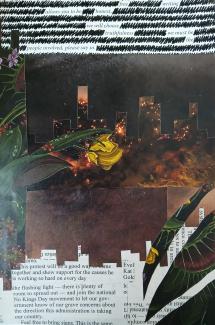And eating cherries in the morning, I think about Icarus
Young, Golden, Brilliant Boy
So overcome by the freedom
So overcome by the ecstasy of it all
That he forgot to heed his father’s warnings
That he felt the sea-spray
That he felt the sun’s sharp rays on his back
And he smiled
And he flew
And he called back to his father
Zooming ahead
This way and that
``We’re going home! ``
Home
Home
Home
And the cherry juice running down my hand
reminds me of the wax
Melting, bubbling, burning
Turning his pale skin red
Dripping and falling
Into the blue sea below
Wax, from the candles
That had been the only source of light
In the dark windowless tower
Wax, that held together each feather
Each feather that gifted him the ability to fly
To soar
To reach out and touch Apollo’s sun
And, spitting out the pit of the cherry, I think about
The pit in Icarus's stomach
As he realizes it was too late
As the far away blue grows closer and closer
As he can see the ripples
As he can see the end of his freedom
So limited, so short
But my sweet Icarus
Never felt fear
Never felt free
In the labyrinth, He was trapped by his father’s ambition
In the tower, Trapped by King Minos
Trapped by all of Crete
I have heard people say that Icarus laughed
As he was plummeting through the sky, he laughed
And who am I to say he didn’t
Who am I to say that sun-drunk Icarus
Reckless and at last uncontained
Didn’t spend his last moments
The sea’s arms reaching up for him
Howling
Screaming joy and triumph
``I flew! I flew!``
And he knew that
Despite the fact that he flew
He was falling
And as I reach for the last cherry in the bowl
Icarus reaches up his arms in a last moment
Before the sea receives him
Before he is pulled under the waves
His father, watching
Screaming
Crying
But in that moment, Icarus was not his father’s son
In the moment of the flight, he was Apollo’s
In the sea, Poseidon's
Soon, he would be Hades’s
So, like the cherry stem I roll and twist between my fingers
Icarus rolled and twisted in the waves
The last dying breath taken from his lungs
His body now sinking
Sea-claimed, Sky-hungry boy
Now void of his free falling flight
Maybe, he could have lived
Grew old in the tower
Or maybe he could have fought
That all-consuming urge
That freedom
Maybe he wouldn’t have reached out and touched Apollo
But he would
Oh, but he would
All over again, given the choice
He would have chosen that last dying flight
The fall
And so Icarus
God-touched
Light-chasing
Sun-drunk Icarus
Flew
Flew
Flew
And fell
And I smile
thinking of my Freedom-mad boy
And I forget about the cherries
And their juice staining my hands



Comments
Log in or register to post comments.